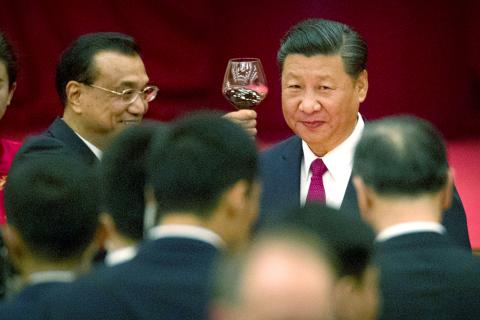Chinese President Xi Jinping (習近平) might introduce a deadline for a resolution on Taiwan during the 19th National Congress of the Communist Party of China this month, according to former American Institute in Taiwan (AIT) chairman Richard Bush.
In a blog post titled “What will Xi Jinping say about Taiwan at the 19th Party Congress?” Bush wrote that Xi might introduce new elements in China’s position on Taiwan, such as a deadline for a solution to what Beijing calls the “Taiwan issue.”
“One possibility here is conveying a sense of urgency about resolving the dispute with Taiwan or even setting a deadline,” wrote Bush, who was AIT chairman from 1997 to 2002 and now serves as codirector of the Center for East Asia Policy Studies at the Brookings Institution.

Photo: AP
Xi had hinted in a meeting in 2013 with former vice president Vincent Siew (蕭萬長) that “settling the dispute could not be postponed from generation to generation,” Bush said.
If Xi wants to reaffirm China’s policy on Taiwan, he would simply repeat common elements in speeches leaders had made at past party congresses, such as the guiding principle of peaceful unification, he said.
However, if Xi does toughen Beijing’s Taiwan policy, for example by not restating the peaceful unification principle, “it would widen China’s options in a coercive direction,” Bush said.
It would suggest that China “would be willing to impose a solution rather than negotiate one on a mutually acceptable basis,” he wrote.
Former AIT director Douglas Paal said he believes that Beijing will likely take a low-key approach on Taiwan at the party congress, which is scheduled to begin on Oct. 18.
Paal, speaking in a panel previewing the congress in Washington on Friday, said his unofficial sources in Beijing told him that no tough talk on Taiwan is expected from the Chinese leader.
Commenting on the possibility of a “fourth US-China communique” emerging from an upcoming meeting between Xi and US President Donald Trump, who is to tour five Asian nations next month, Paal said it was highly unlikely to happen.
The question of a fourth joint communique, which would follow the three communiques on Taiwan that the US and China issued between 1972 and 1982, arose in a report in the Taiwan-based Chinese-language Liberty Times (sister newspaper of the Taipei Times) published earlier this year.
The report, citing an unnamed source, said that former US secretary of state Henry Kissinger was trying to get the two nations to sign such a document.
Paal, who is vice president for studies at the Carnegie Endowment for International Peace, said he expects Washington to continue to show its support for Taiwan based on the US’ Taiwan Relations Act and would not sign a fourth communique.

Chinese spouse and influencer Guan Guan’s (關關) residency permit has been revoked for repeatedly posting pro-China videos that threaten national security, the National Immigration Agency confirmed today. Guan Guan has said many controversial statements in her videos posted to Douyin (抖音), including “the red flag will soon be painted all over Taiwan” and “Taiwan is an inseparable part of China,” and expressing hope for expedited reunification. The agency last year received multiple reports alleging that Guan Guan had advocated for armed reunification. After verifying the reports, the agency last month issued a notice requiring her to appear and explain her actions. Guan

GIVE AND TAKE: Blood demand continues to rise each year, while fewer young donors are available due to the nation’s falling birthrate, a doctor said Blood donors can redeem points earned from donations to obtain limited edition Formosan black bear travel mugs, the Kaohsiung Blood Center said yesterday, as it announced a goal of stocking 20,000 units of blood prior to the Lunar New Year. The last month of the lunar year is National Blood Donation Month, when local centers seek to stockpile blood for use during the Lunar New Year holiday. The blood demand in southern Taiwan — including Tainan and Kaohsiung, as well as Chiayi, Pingtung, Penghu and Taitung counties — is about 2,000 units per day, the center said. The donation campaign aims to boost

The Kaohsiung Tourism Bureau audited six hotels in an effort to prevent price gouging ahead of Korean band BTS’ concert tour in the city scheduled for Nov. 19, 21 and 22 this year. The bureau on Friday said that the audits — conducted in response to allegations of unfair pricing posted on social media — found no wrongdoing. These establishments included the local branches of Chateau de Chine, Hotel Nikko, My Humble House, and Grand Hai Lai, it said, adding that the Consumer Protection Commission would have penalized price gougers had the accusations been substantiated. The bureau said the Tourism Development Act

BACK TO WINTER: A strong continental cold air mass would move south on Tuesday next week, bringing colder temperatures to northern and central Taiwan A tropical depression east of the Philippines could soon be upgraded to be the first tropical storm of this year, the Central Weather Administration (CWA) said yesterday, adding that the next cold air mass is forecast to arrive on Monday next week. CWA forecaster Cheng Jie-ren (鄭傑仁) said the first tropical depression of this year is over waters east of the Philippines, about 1,867km southeast of Oluanpi (鵝鑾鼻), and could strengthen into Tropical Storm Nokaen by early today. The system is moving slowly from northwest to north, and is expected to remain east of the Philippines with little chance of affecting Taiwan,